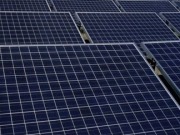
Only three solar PV plants in operation today are bigger than the planned Blue Energy project. The plant will be the first to go ahead under Ghana’s 2011 Renewable Energy Act and will increase the country’s current generating capacity by 6% meeting 20% of the government’s target of generating 10% of its electricity from renewable sources by 2020. The new Act set up a system of Feed-in Tariffs and is a success for the government’s policy of attracting international finance. Last month Energy Minister Joe Oteng-Adjei announced he was seeking $1 billion of private investment to help Ghana achieve its renewables target.
The US $400 million scheme will be fully operational in 2015 and Blue Energy plans to develop further renewable energy power plants in West Africa with a number of projects in the pipeline. The site enjoys good solar radiation, has excellent access to the major road system and is within easy reach of a deep water port at Takoradi. The plant will be directly connected to the 161kV West African Power Pool transmission line, which runs alongside the site, linking Ghana to Ivory Coast, Togo, Benin and Nigeria, and has available capacity for its load.
Installation of more than 630,000 solar PV modules will begin by the end of 2013 and electricity generation will start early the next year, with sections coming on stream as they are completed. The project is due to reach full capacity by October 2015. The project will boost the economy of Western Ghana. It will create 500 jobs over the two-year construction period and 200 permanent jobs in operation. It is also expected to stimulate another 2100 jobs in the local economy, by sub-contracting activities to local companies and increasing demand for goods, services and education.
“Ghana’s forward-thinking strategy puts it in a strong position to lead the renewable energy revolution in sub-Saharan Africa” said Chris Dean, CEO of Blue Energy. “Nzema is a case study in how governments can unlock the huge potential for solar energy in Africa. We are delighted that it will make a strong contribution to the national economy, provide much needed generating capacity and help develop the skills of the future. There’s huge potential to develop renewable power in the region. We believe Nzema will show other countries what can be achieved and spur them to action.”
Blue Energy has secured all the consents it needs to go ahead with the project. Ghana’s electricity regulators, the Energy Commission and the Public Utilities Regulatory Commission, have awarded it a generation licence and a feed-in tariff for the plant’s 20-year operational life. The company will now conclude discussions with a number of international financial institutions and global equity and infrastructure funds which have expressed interest in providing debt financing or investing in the project. It expects to reach financial close in the first half of 2013.
Ghana is one of the fastest growing economies in sub-Saharan Africa, with 14.4% GDP growth in 2011. Demand for power is growing at 10-15% a year, but lack of reliable generating capacity has acted as a brake on the economy: power shortages are estimated to have cost 1.9% of GDP in 2006. Much of Ghana’s electricity is hydroelectric, but this is vulnerable to drought, and the country is increasingly reliant on expensive oil generation. Blue Energy meanwhile is one of Europe’s largest private asset and development companies with £2.5 billion of assets under management.
Further information:

